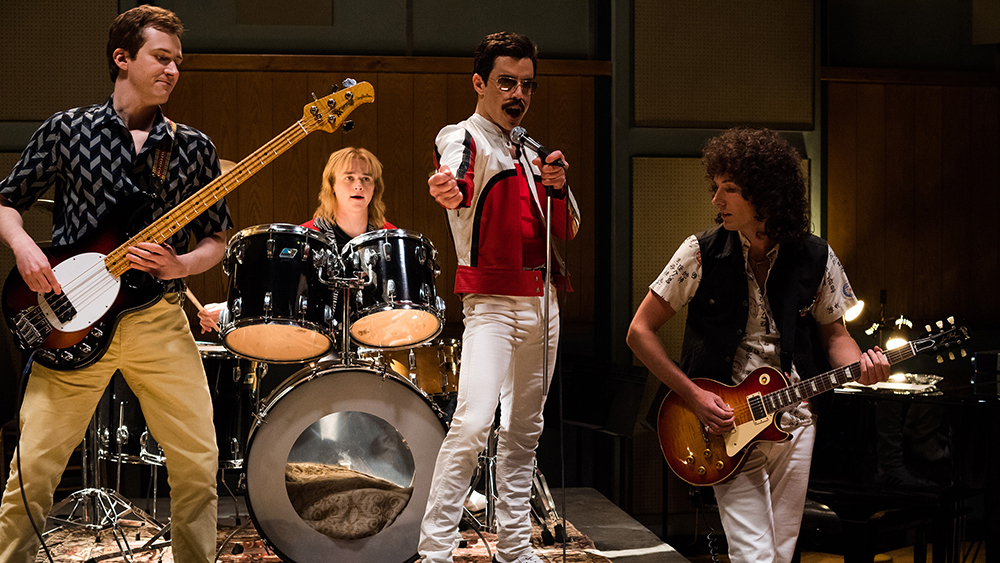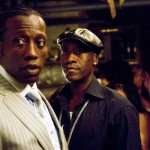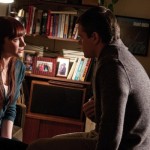Bohemian Rhapsody Review
Few bands in rock history are larger than life in the same way as Queen. Freddie Mercury, Brian May, Roger Taylor, and John Deacon incorporated elements of electronica, heavy metal, British pop, and opera into their catalog of songs, which is still play in stadiums, arenas, and karaoke bars and all over popular media.
The lives of the men behind the music take center stage in Bohemian Rhaposdy, a traditional musical biopic from director and credibly and repeatedly accused sexual predator Bryan Singer. The film began shooting in September 2017 with Singer at the helm, but he rather infamously clashed with folks on set, and by December, right around the time he faced renewed attention for assaulting and harassing minor boys going back to the 1990s, he was dismissed from the production.
Dexter Fletcher, most recently of Eddie the Eagle fame, stepped into replace Singer, but due to DGA guidelines, Singer’s name remains on the film as its sole director. Fletcher got an executive producer credit for his efforts.
It’s all, frankly, insane, especially when you consider that Singer brought nothing exceptional to the table to begin with. The film’s script is basic, and its execution is even less inspired. Musical numbers are filmed on darkened, indistinguishable stages while neon titles proclaim the exotic locations where the band is taking off. Time passes without acknowledgment. Iconic, complicated, and beautiful songs are dreamed up in an instant because depicting the creative process is too tricky for a film that has to cover nearly 25 years in two hours. Instead, that time gets devoted to a plethora of interchangeable straight, white lawyer/manager types and the one gay one who’s so manipulative that he, for a time, destroys the band.
Then there’s Rami Malek, whose fiery performance almost makes the watch worthwhile. Early in the film, Freddie’s teeth are his most defining characteristic, and Malek leans on it uncomfortably. After the band starts to becoming something, however, we get glimpses of his personal struggles with his family, love life, and sexuality. And that’s juxtaposed with a public persona that’s brimming with a confidence that’s both infectious and intimidating.
The film is book-ended by Queen’s performance at the 1985 Live Aid concert in London, and it’s by far the best material it has to offer. It’s presented, mostly, without interruption, and by this point, Malek is all the way in, owning the stage like a real pro. Admittedly, it’s easy enough to have a crowd of 75,000 in the palm of your hand when most of it is CGI, but there’s energy and presence and then there’s what Malek offers in Bohemian Rhapsody’s final 20 minutes.
Unfortunately, he has more charisma in his pinky finger playing Mercury than the rest of the cast does combined. The rest of the band is window dressing, performance-wise. Lucy Boynton plays Freddie’s fiance, Mary, with some grace and skill, but the film so woefully tiptoes around the complicated dynamics of their relationship that she becomes an afterthought as the film goes on. Of the suits surrounding the band, Mike Myers is perhaps the most notable, at least insofar as he’s not a total blank slate. That doesn’t mean he’s good, of course. He’s there because of the title song’s importance in the Wayne’s World cinematic universe, and it’s stunt casting at its worst. But at least he pops a little. That’s more than can be said for Tom Hollander, Aidan Gillen, and others.
It’s hard to say if Bohemian Rhapsody could have been a better film with a less chaotic director situation or, frankly, someone more skilled at the helm from the start. The fact is the material is only mildly intriguing because the band’s songs are so dynamic. Malek gives it his all (and will, I think, earn an Oscar nomination for his efforts), but there’s only so much one performance can do.

















